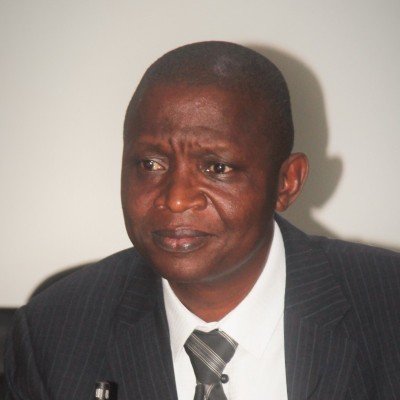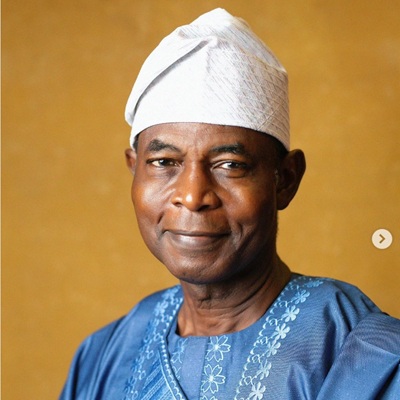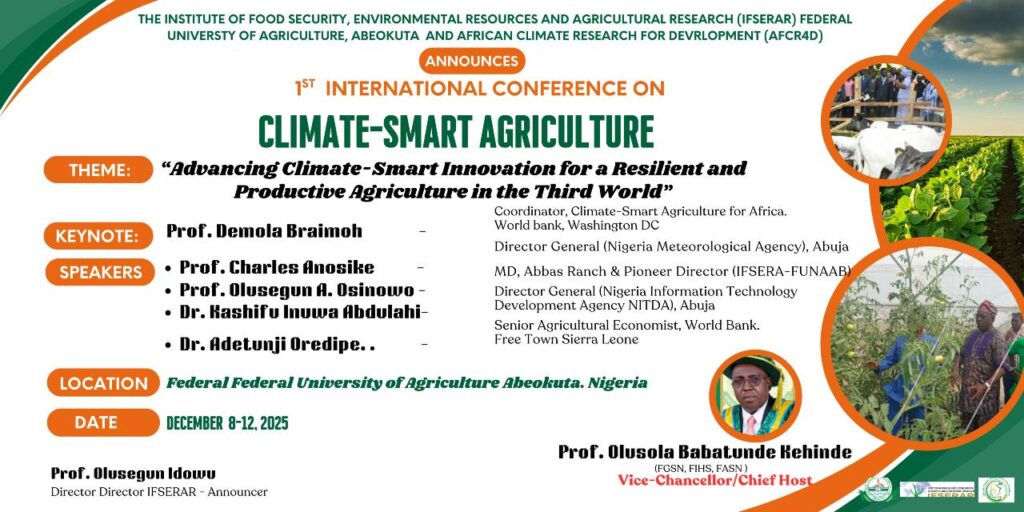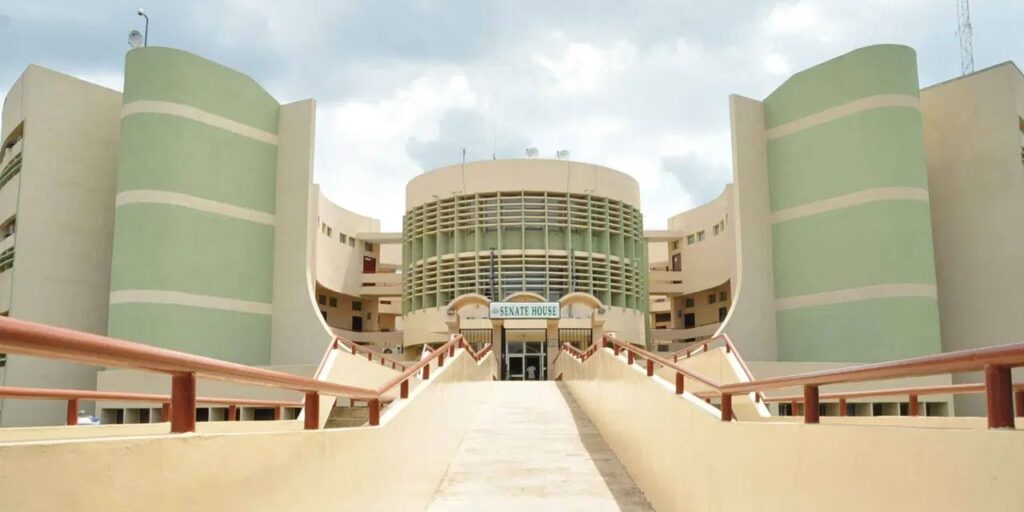- Phone: +234 701 525 3512
- info@cewsng.funaab.edu.ng
- Mon-Fri: 7:00 - 18:00
1st International Conference On
Climate-Smart Agriculture
(CSA 2025)
Advancing Climate-Smart Innovations for Resilient and Productive Agriculture in the Third World.
10 - 12 December 2025
Federal University of Agriculture, Abeokuta (FUNAAB), Nigeria
Quick Links
Download Brochure
Welcome to CSA 2025
Welcome to the First International Conference on Climate-Smart Agriculture (CSA 2025). The event will convene stakeholders from research, government, industry, civil society, and farming communities to exchange innovations that strengthen agricultural resilience in the face of climate change. Over three days, participants will experience keynote lectures, technical sessions, field visits, and policy dialogues designed to advance actionable solutions.
Join us at FUNAAB, Abeokuta, from 10–12 December 2025, and be part of shaping climate-smart agricultural futures in the Third World.
About CSA 2025
CSA 2025 will provide a platform to raise awareness, share research outputs, and promote adoption of climate-smart practices. The conference emphasizes multi-sectoral collaboration and knowledge co-creation for agricultural resilience.
Conference Objectives
- Raise awareness on CSA principles, practices, and technologies
- Showcase research outputs, field experiences, and policy options relevant to CSA
- Promote adoption of climate-resilient practices by farmers and agro-industries
- Strengthen collaboration among academia, government, private sector, and civil society
- Identify funding and policy frameworks that support CSA innovations in Southwest Nigeria
Dates of Importance
View the Call for Papers for the conference tracks and Paper Submission Guidelines to submit your research papers for the First International Conference on Climate-Smart Agriculture 2025. Registrations must be done Online, and those who register on or before the Early deadline may enjoy a special discounted rate in terms of registration fees. If you have any inquiries please contact us at info@iccsaconf.funaab.edu.ng , csmartagricconf2025@gmail.com or drop a message here.
Authors will be notified of Abstract acceptance within 7 to 14 days. The optional full paper submission, including detailed guidelines for publication in Edited Conference Proceedings, peer-reviewed journals, will be emailed after the conference.
- Abstract and full paper submission now extended till 25th November
Theme & Sub-themes
Theme: Advancing Climate-Smart Innovations for Resilient and Productive Agriculture in the Third World
Sub-themes:
- Climate-resilient crops and livestock systems
- Smart irrigation and water management
- Soil health, carbon sequestration, & regenerative agriculture
- ICT, Remote Sensing, & AI for climate-smart farming
- Early warning systems & agro-weather advisory tools
- Youth and women in CSA
- Climate finance & risk insurance for smallholder farmers
- CSA policies, investments, and institutional frameworks
- Indigenous Knowledge System in Climate-smart Agriculture
- Climate-Smart Agricultural Innovations for Antimicrobial Resistance
Call for Paper
The 1st International Conference on Climate-Smart Agriculture (ICCSA), scheduled for 10–12 December 2025 in Abeokuta, Nigeria, invites the submission and presentation of high-quality research papers highlighting innovations across all areas of climate-smart agriculture.
This prestigious event is designed to provide a global platform for academics, researchers, industry practitioners, policymakers, managers, and students to share their findings, exchange ideas, and engage with leading experts in the field.
All full paper submissions will undergo a rigorous peer-review process and will be evaluated for originality, technical and research depth, accuracy, and alignment with the conference theme.
Given the uniqueness of this conference, we encourage colleagues to think innovatively and explore a broad spectrum of topics related to climate-smart agriculture. To provide participants with the flexibility needed to share their work, we welcome submissions on the suggested topics as well as other closely related areas that advance CSA innovations.
- Climate-smart agricultural financing: credit, insurance, carbon markets, and blended finance
- Incentives, subsidies, and carbon pricing for CSA adoption
- Economic modelling and cost–benefit analysis of CSA practices
- Climate and agricultural energy policy, trade, and agribusiness resilience
- Institutional frameworks, governance, and administration of CSA programs
- Global-to-local CSA strategies and policy linkages (UNFCCC, SDGs, AU Agenda 2063)
- Monitoring, evaluation, and accountability frameworks
- Air pollution impacts on crops, livestock, and farm productivity
- Climate systems, atmospheric changes, and agro-impacts
- Agro-climatology and farm-level simulation modelling
- Weather science for farmers: agro-advisories, insurance, and forecasting tools
- Extreme weather (droughts, floods, storms, heatwaves) and adaptation strategies
- Agromet platforms, early warning systems, and decision support
- Development of climate-resilient crop varieties and seed systems
- Role of beneficial microbes, biotechnology, and pollinator ecology in CSA
- Biodiversity and agro-ecosystem conservation for resilience
- Agro-ecology, regenerative agriculture, and ecosystem-based adaptation
- Horticultural innovations: stress-tolerant crops, protected cultivation, and post-harvest CSA
- Nutritional security and food safety in changing climates
- Soil carbon sequestration, carbon dynamics, and regenerative practices
- Soil fertility, geochemistry, and land–climate interactions
- Climate-smart infrastructure and geotechnics (roads, storage, irrigation canals)
- Groundwater dynamics, ecohydrology, and smart water management
- Land degradation neutrality, salinity intrusion, and soil restoration
- Disaster risk reduction: floods, erosion, landslides, and hazards in agriculture
- Smart irrigation, renewable energy integration, and low-carbon mechanization
- Green technologies: waste-to-energy, recycling, and circular economy in agro-industries
- Emission control in farming (fertilizers, manure, residues)
- Climate-smart post-harvest handling and agro-processing infrastructure
- Renewable and sustainable biofuels for agriculture
- Robotics, drones, and precision mechanization for CSA
- Climate-resilient livestock breeds and health management
- Heat stress mitigation and methane reduction in ruminants
- Early warning for animal diseases under climate change
- One Health approaches linking livestock, wildlife, humans, and ecosystems
- Livestock emissions and adaptation to extreme weather
- Climate-smart aquaculture: low-carbon, water-efficient, and integrated systems
- Fish breeding and species resilience under climate stress
- Aquaculture under salinity stress, sea-level rise, and coastal changes
- Post-harvest fish processing technologies for emissions reduction
- Marine–agriculture linkages and food security
- AI and machine learning for crop, livestock, and climate risk management
- Mobile apps, blockchain, and decision support for CSA adoption
- Remote sensing and GIS for crop monitoring, soil mapping, and vulnerability assessment
- Drone-based technologies for climate-smart monitoring and response
- Digital platforms for extension, agro-weather advisories, and insurance tools
- Climate-smart food processing, preservation, and packaging technologies
- Alternative proteins and resilient food systems
- Value addition to climate-resilient crops
- Circular food systems and waste valorization
- Functional foods and nutrition security under climate change
- Wildlife, biodiversity, and agro-ecosystem services under climate stress
- Human–wildlife conflict in agricultural landscapes
- Pest and disease biogeography in changing climates
- Biodiversity corridors and agro-ecological zoning for resilience
- Landscape-level conservation farming and CSA
- Climate change adaptation in agriculture (farm to policy level)
- Deforestation, land use change, and forest–agriculture balance
- CO₂ capture in agriculture: agroforestry, soils, and cropping systems
- Sustainability pathways for resilient food security in the Global South,
- Practical approaches to integrating CSA into smallholder and commercial farms
- Hands-on training in precision agriculture tools for resource-efficient farming
- Smart irrigation, water harvesting, and climate-resilient water management techniques
- Using mobile apps, GIS, and remote sensing for farm-level decision-making
- Artificial intelligence and data-driven advisory services for farmers
- Building capacity for digital extension platforms and e-learning in agriculture
- Professional training in soil health monitoring and regenerative practices
- Carbon accounting and reporting for farms and agribusinesses
- Ecosystem-based approaches for land restoration and sustainable intensification
- Veterinary innovations for managing climate stress in livestock
- Methane reduction strategies for ruminants in professional practice
- Climate-smart aquaculture: low-carbon and water-efficient systems
- Designing climate-smart business models for agro-industries
- Climate finance instruments and insurance products for practitioners
- Policy literacy for agricultural professionals: from global agreements to local action
- Post-harvest innovations for reducing losses in hot and humid climates
- Food safety and nutrition security under climate variability
- Circular economy and waste-to-value opportunities in food processing
- Building professional capacity in agro-weather forecasting and advisories
- Risk assessment and disaster preparedness for farming communities
- Integrating early warning systems into extension and rural advisory services
- Strengthening multi-sector collaboration for CSA adoption
- Monitoring, evaluation, and impact assessment skills for CSA projects
- Leadership development for young professionals and women in CSA
We warmly encourage you to invite colleagues to participate in the conference and to submit original research in response to the Call for Papers. Authors will receive notification of abstract acceptance within two days of submission. Detailed guidelines for optional full paper submission — for publication in the Edited Conference Proceedings, peer-reviewed reputable journals, or as a Monograph — will be provided by email a few weeks after the conference.
Scientific Committee
The Scientific Committee comprises distinguished national and international experts across climate science, agriculture, environmental management, and policy. They will oversee the peer-review of submissions, ensuring quality and rigor. (Pictures)
Conference Speakers

Keynote Speaker
Professor Demola Braimoh
Coordinator, Climate-Smart Agriculture for Africa, World Bank, Washington DC

Lead Speaker
Dr. Adetunji Oredipe
Senior Agriculture Economist, World Bank Office, Freetown, Sierra Leone

Guest Speaker 1
Dr. Kashifu Inuwa Abdulahi
Director General (NITDA), National Information Technology Development Agency

Guest Speaker 3
Prof. Charles Anosike
Director General (NIMET), Nigerian Meteorological Agency

Guest Speaker 4
Prof. Olusegun A. Osinowo
First Director of IFSERAR FUNAAB, MD, Abass Ranch Ltd.
Publications
- Accepted abstracts will be published in the CSA 2025 Book of Abstracts (ISBN).
- Selected full papers will be published in peer-reviewed journals and edited volumes.
- Each paper will be assigned a DOI and undergo plagiarism screening.
Registration
Categories:
- Local Delegate (Nigeria)
- International Delegate
- Student Delegate
- Listener/Virtual Participant’
Deadlines & Fees:
- Early Bird (before 30 Sept 2025) – discounted rates
- Standard (after 1 Oct 2025) – full rates
- At least one author of each accepted paper must register
Target Participants
The conference seeks to host a wide range of stakeholders, including:
- Embassies
- Multinational companies
- Academics and researchers
- Government agencies (FMARD, NASDRA, NIMET, NARSDA, etc.)
- Farmers, cooperatives, and extension agents
- NGOs and CSOs working in agriculture and climate
- Development partners and donors (FAO, UNDP, IFAD, GIZ, etc.)
- Private sector actors (Agri-tech firms, agro-industries, banks)
- Media organizations
- Youth and student groups
Venue
The conference will take place at the Federal University of Agriculture, Abeokuta (FUNAAB), Nigeria, in the University Main Auditorium. Field visits to Climate-Smart demonstration farms and Climate-Smart villages in Southwest Nigeria are scheduled for Day 2.
Visa & Travel
International participants requiring visas will be provided with official invitation letters after completing registration. Travel and accommodation information, including recommended hotels in Abeokuta, shuttle services, and campus maps, will be posted here.
History
This is the first edition of the International Conference on Climate-Smart Agriculture at FUNAAB. The event marks the beginning of a recurring platform for advancing CSA in Nigeria and the wider Third World.



